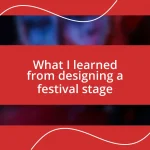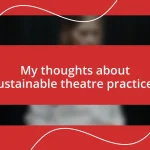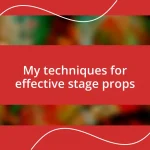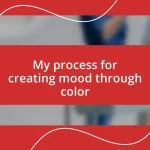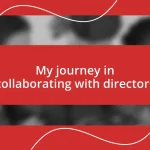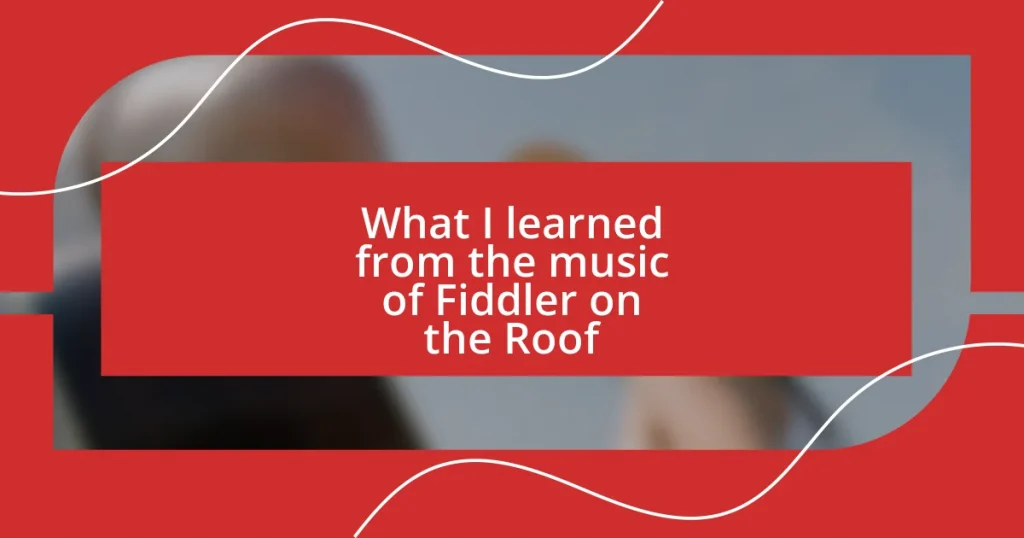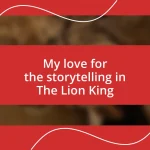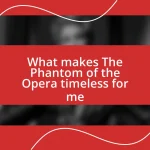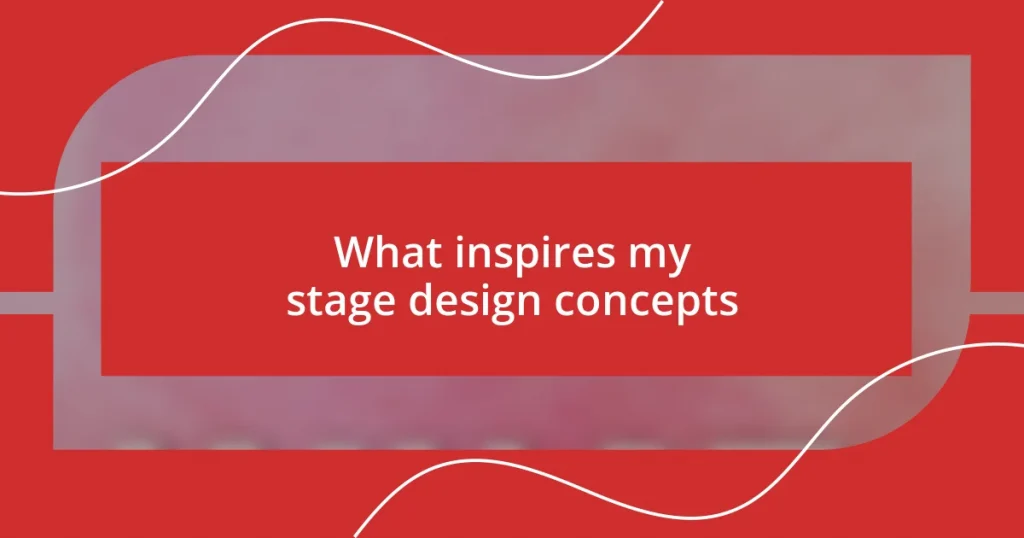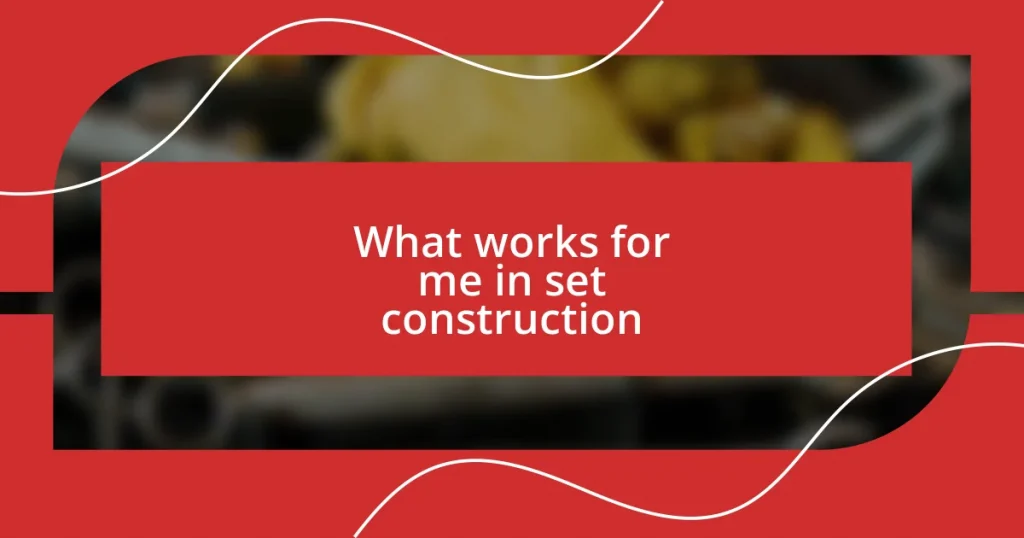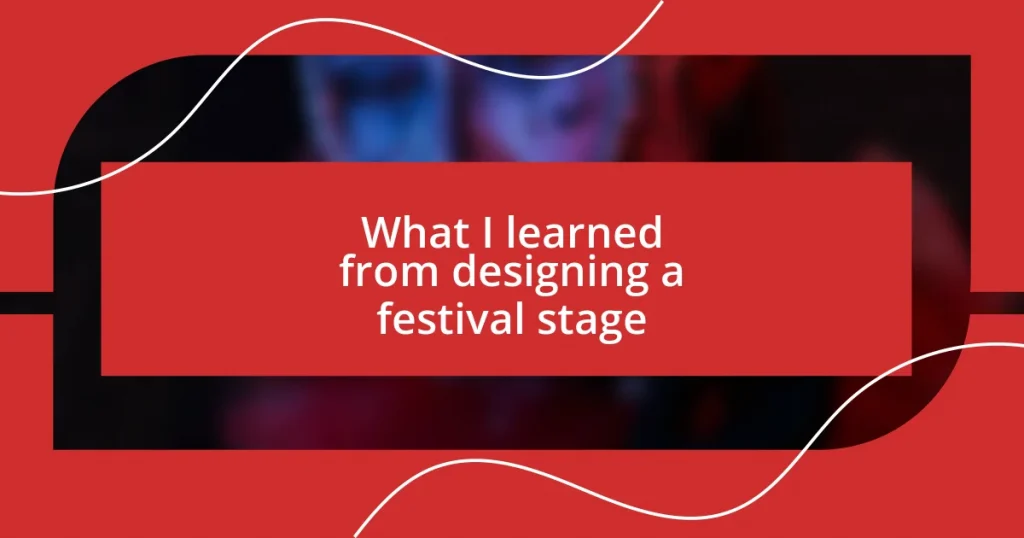Key takeaways:
- Fiddler on the Roof explores the tension between tradition and change, illustrating how personal desires often conflict with familial expectations.
- The music serves as a powerful lens through which we understand cultural identity, emotional connections, and the human experience, capturing universal themes and personal aspirations.
- Key characters, such as Tevye, Hodel, and Yente, provide lessons on resilience, the importance of standing up for one’s beliefs, and the impact of societal expectations on individual choices.
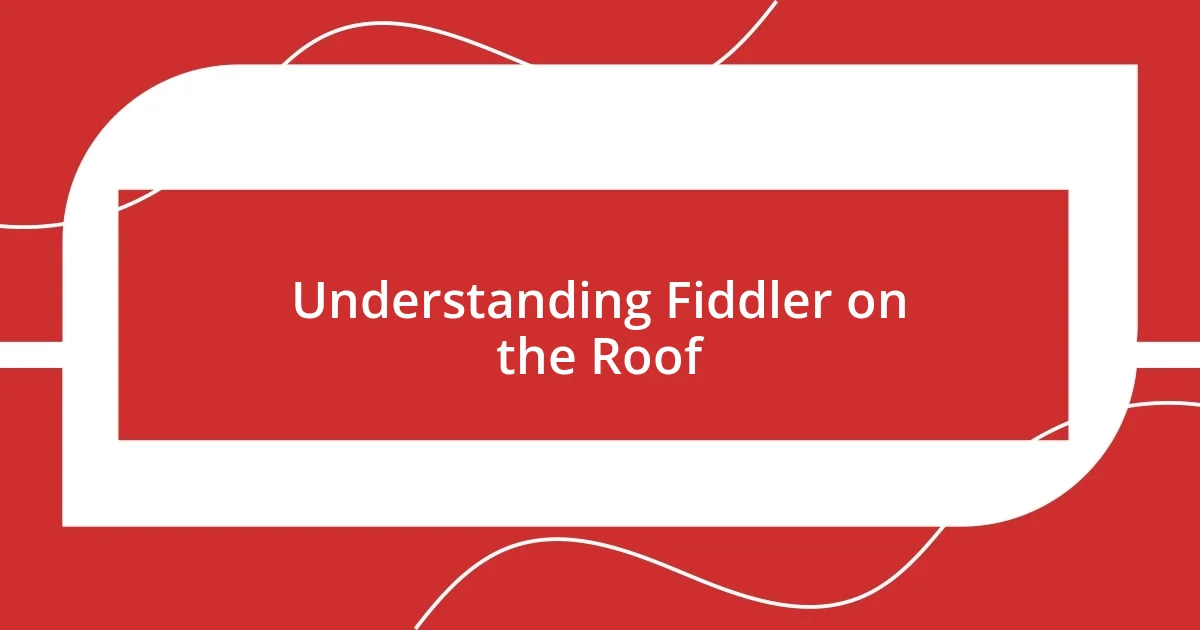
Understanding Fiddler on the Roof
Fiddler on the Roof resonates deeply with me, primarily because it masterfully explores the balance between tradition and change. I remember attending a production years ago, feeling an overwhelming sense of nostalgia as the character Tevye grapples with the expectations of his family and community. It made me ponder: how do we reconcile our own traditions with the inevitable shifts in our lives?
The music in Fiddler, from “Tradition” to “Sunrise, Sunset,” perfectly encapsulates the emotional landscape of each character’s journey. It’s fascinating how a simple melody can evoke such powerful feelings, turning personal struggles into universal themes. I often find myself reflecting on how music has the ability to articulate what words alone cannot; it’s a reminder of our shared human experience.
Additionally, the complexity of the characters keeps me engaged. Each song reveals layers of their personalities and dilemmas, such as the hopeful love of Tevye’s daughters and the burdens Tevye carries. Isn’t it interesting how we see ourselves in these characters, feeling their joy and pain as if it were our own? For me, this connection is what makes Fiddler on the Roof not just a story about a specific place and time, but a timeless exploration of life itself.
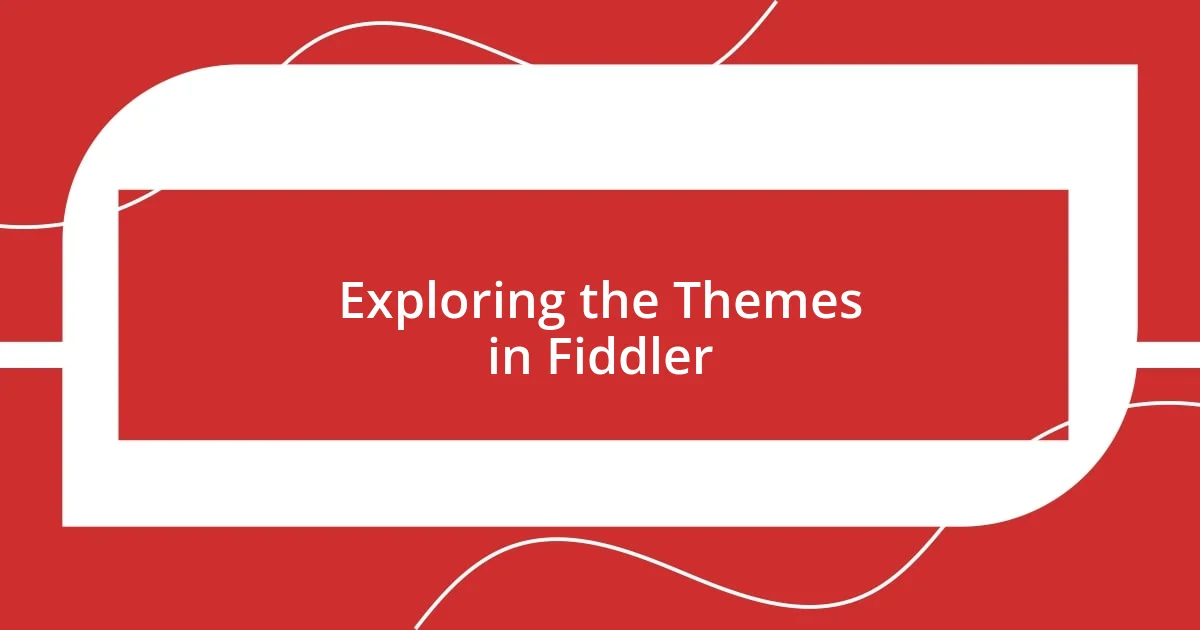
Exploring the Themes in Fiddler
As I delved deeper into Fiddler on the Roof, I was struck by the theme of familial duty versus personal desire. It reminded me of a heated discussion I once had with my family about career choices. Watching Tevye grapple with his daughters’ choices echoed my own struggles, illustrating how love can complicate the ties that bind us. This inner conflict is a powerful reminder that pursuing individual happiness can sometimes come at a cost to cherished traditions.
Key themes in Fiddler on the Roof:
- Tradition vs. Change: The constant tension between maintaining cultural practices and embracing new ideas.
- Generational Conflict: The differing perspectives and aspirations of parents and their children.
- Love and Sacrifice: The struggles of personal desires in the face of familial expectations, showcasing love’s complexities.
- Community and Belonging: The importance of connection to one’s roots, while also recognizing the inevitability of change in a shared environment.
- Resilience in Adversity: The ways characters adapt to loss and change, underscoring the strength of the human spirit.
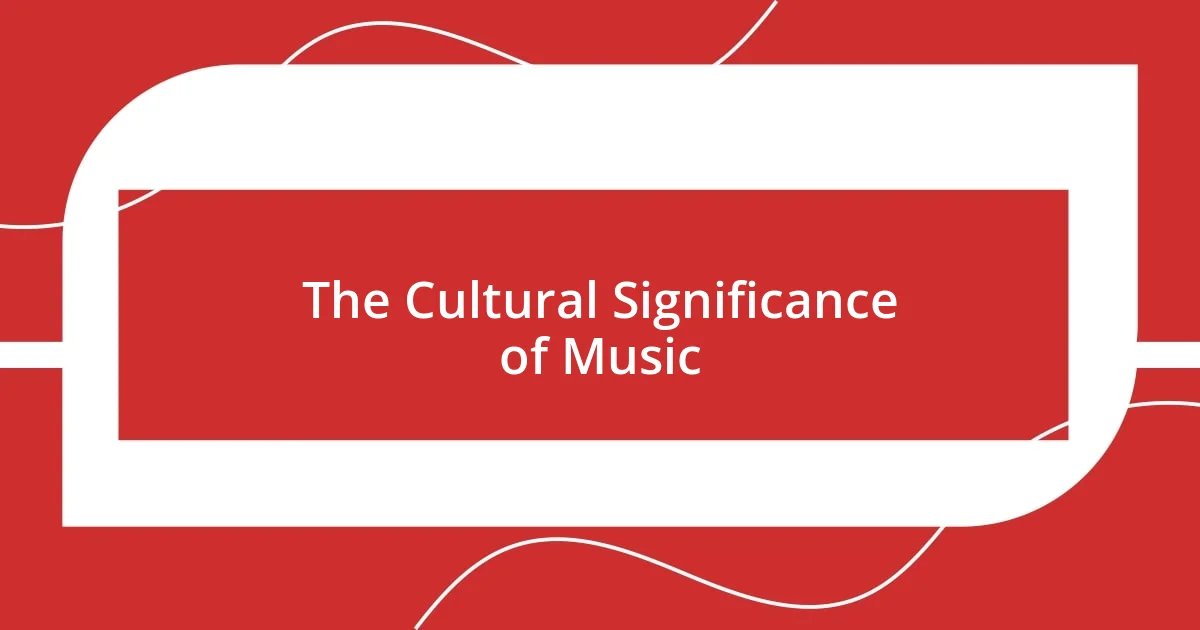
The Cultural Significance of Music
The music in Fiddler on the Roof offers a remarkable lens through which to understand cultural identity and the human experience. Personally, I’ve often found that songs can serve as poignant markers of my own memories and origins. When I listen to “Matchmaker, Matchmaker,” I’m transported back to my youth, reflecting on the dreams and hopes my own family had for me, paralleling the desires of Tevye’s daughters. This powerful connection illustrates music’s role in preserving cultural narratives and shaping our understanding of who we are.
Moreover, the emotional weight of the score is vital in conveying the struggles faced by the characters. As I listen to “If I Were a Rich Man,” Tevye’s yearning for a better life resonates deeply with me. It brings to mind conversations I’ve had about aspiration and the pull of material dreams. Music has this incredible ability to crystallize feelings, merging personal aspirations with collective cultural experiences. I often wonder: how does music help us define our aspirations and challenges?
Lastly, the songs encapsulate a community’s spirit, bridging generational gaps and fostering shared experiences. Each melody tells a story, echoing the struggles and triumphs of a culture shaped by history. Reflecting on how these tunes have traveled through time, I can’t help but appreciate how music brings us together, creating a sense of belonging in a fast-changing world. Isn’t it amazing how music creates a shared language that transcends individual experiences?
| Element | Significance |
|---|---|
| Emotional Connection | Music evokes strong feelings tied to personal and shared experiences. |
| Cultural Identity | Melodies narrate stories that inform and shape our understanding of ourselves. |
| Community Bonding | Music fosters shared experiences, bridging gaps across generations. |
| Reflection of Aspirations | Through songs, individuals explore desires, aspirations, and struggles. |
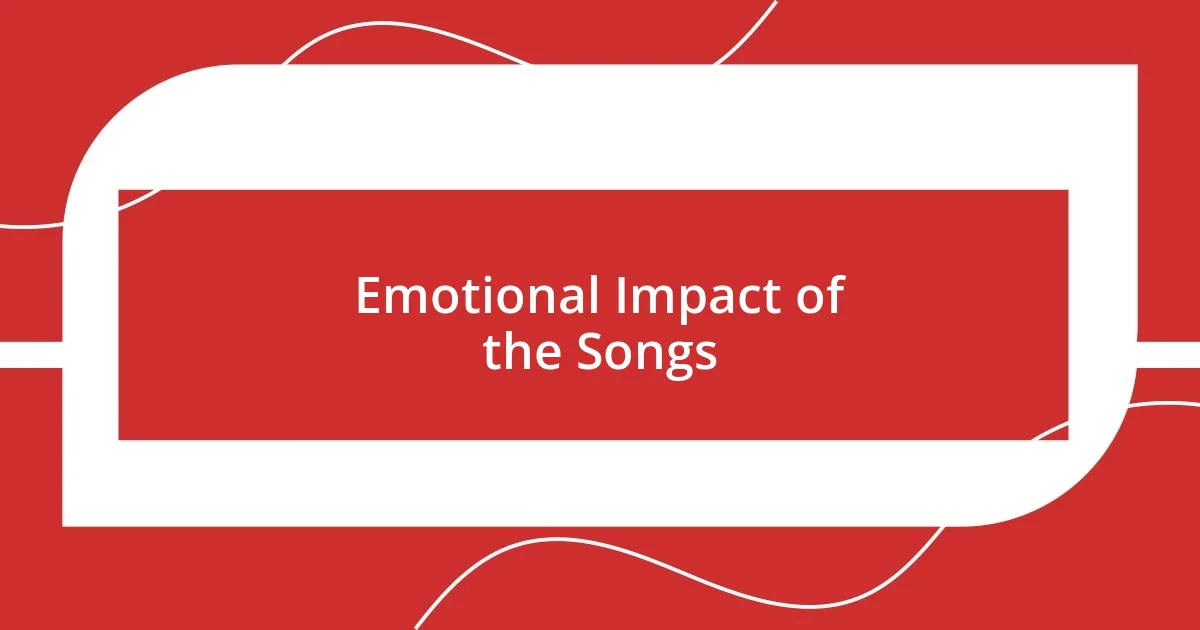
Emotional Impact of the Songs
The songs in Fiddler on the Roof profoundly stir up emotions that linger long after the final note fades. For instance, when I hear “Sunrise, Sunset,” I can’t help but feel a twinge of nostalgia as I reflect on my own family milestones. It captures the bittersweet passage of time, making me ponder: how often do we pause to celebrate the fleeting moments with our loved ones? This song reminds us that life’s most precious memories are often wrapped in simplicity.
Listening to Tevye’s heartfelt delivery in “If I Were a Rich Man” invokes my own dreams and frustrations. I remember vividly when I was wrestling with my career path, enveloped in the same kind of longing Tevye articulates. That yearning not only reveals the universal desire for security and prosperity but invites listeners to consider their ambitions. Doesn’t this resonate with you too? The song’s infectious rhythm and poignant lyrics create a shared emotional experience that binds the audience to Tevye’s struggle.
Moreover, I find that the ensemble pieces, like “Tradition,” resonate with the challenges of upholding family values amid life’s chaos. They echo my childhood family gatherings, where the weight of heritage was both a comfort and a burden. I often think: how can we cherish our roots while embracing change? Such questions remind us that the emotional impact of these songs resonates beyond the stage, echoing through our daily lives and fostering a deeper understanding of the delicate balance between heritage and progress.

Lessons from Fiddler’s Characters
The characters in Fiddler on the Roof each embody unique lessons about resilience and adapting to change. For instance, my heart always goes out to Tevye as he grapples with his daughters’ choices. I remember feeling similarly torn when my younger sibling decided to pursue a career far from our family tradition. It made me realize that, much like Tevye, we often find ourselves navigating the tricky waters of love and duty, questioning how to honor our heritage while embracing personal happiness.
Then there’s Hodel, who teaches us the importance of standing up for what we believe in, even in the face of opposition. Her decision to leave Anatevka for love reminds me of a friend who left home to follow her passion for art, despite her family’s disapproval. I admire the courage it takes to prioritize one’s values, and I often ask myself: how can we support others in making such bold choices? Hodel’s journey resonates deeply, illustrating that true strength lies in having the conviction to pursue our hearts’ desires.
Finally, Yente, the matchmaker, reveals the complexities of societal expectations and the roles we play within our communities. Listening to her chatter always brings a smile because, in a way, she reminds me of my own relatives who think they know what’s best for us. Isn’t it interesting how we sometimes feel pressured to conform to others’ expectations? Yente’s character highlights that while community ties are important, we must also carve our paths and not let others dictate our futures.
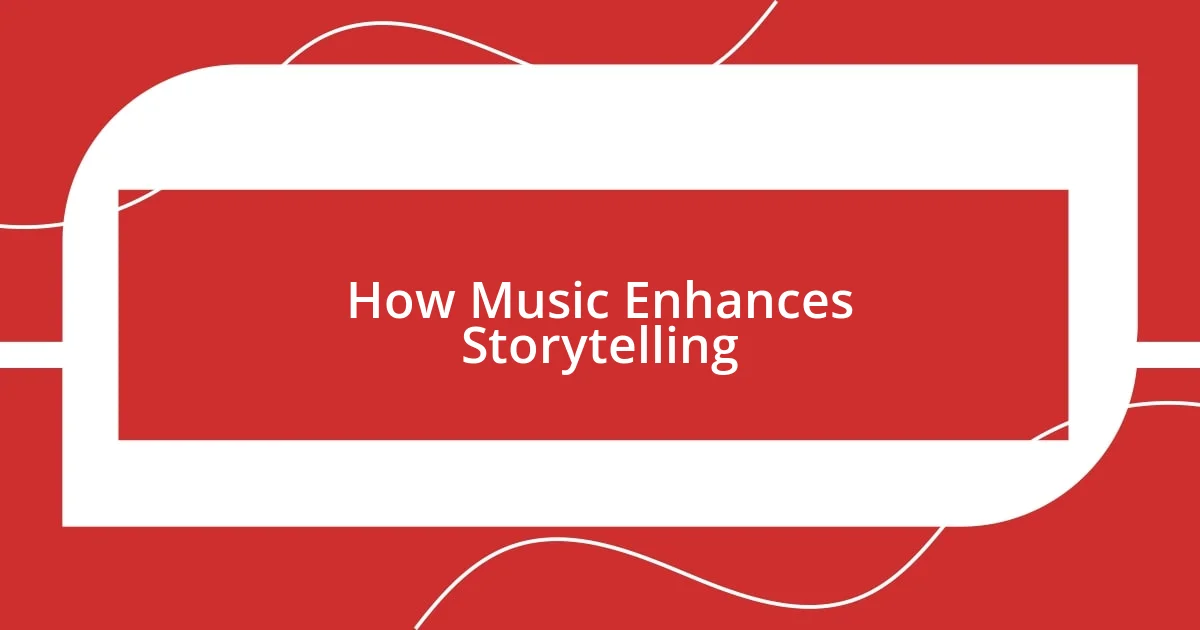
How Music Enhances Storytelling
The music in Fiddler on the Roof acts as a powerful vehicle for storytelling, weaving melodies seamlessly with the narrative. I remember the first time I heard “Matchmaker, Matchmaker.” It struck me how the playful rhythm perfectly matched the character’s innocent yet anxious yearning for love. It’s a musical moment that pulls you into their world, illustrating not only their desires but also the societal expectations they grapple with. Isn’t it amazing how a simple tune can evoke such rich layers of meaning?
In my experience, music often highlights critical emotional transitions in a story. Take, for instance, the transition from joy to sorrow in “Anatevka.” The bittersweet harmonies resonated with me during a time when I was leaving my hometown for the first time. The nostalgia wrapped in that song made the moment all the more poignant, reminding me of the ties that bind us to our roots. Didn’t that feeling of leaving something cherished resonate with you as well? It’s moments like these that music elevates, transforming simple plot points into heartfelt experiences.
Songs like “Now I Have Everything” beautifully showcase how pivotal moments in a character’s journey are accentuated through music. I recall feeling a mix of joy and confusion when I graduated college, much like the character who finds momentary bliss. The music captured that fleeting sense of fulfillment alongside an underlying uncertainty about what came next. This duality is something that I think we all experience at some point. The complexity of these emotions is where music really enhances storytelling, allowing us to connect deeply with the characters on an emotional level.
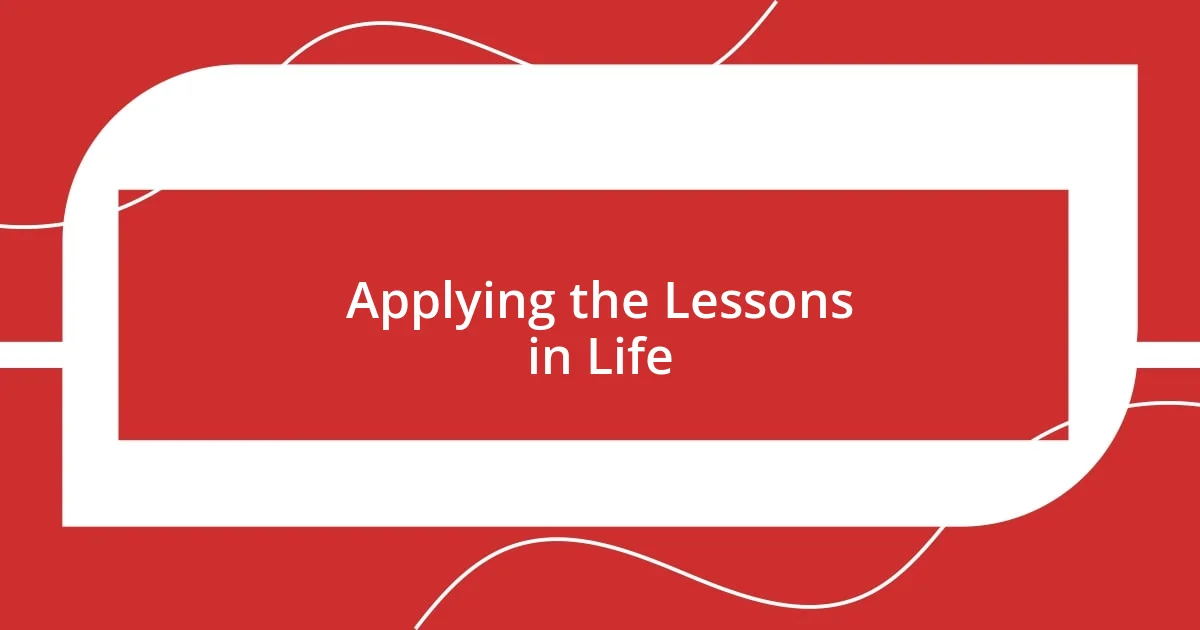
Applying the Lessons in Life
Embracing the lessons from Fiddler on the Roof requires us to actively apply them in our everyday lives. I remember a time when I wrestled with a major career decision, feeling as if I was teetering between personal ambition and familial expectations. Much like Tevye’s struggles, I found that listening to the conflict of tradition versus change in the music inspired me to seek a balance. How often do we let our past shape our future instead of allowing our passions to lead the way forward?
The stories of the characters push me to reflect on the decisions I make regarding my relationships and values. I think about the moments when I’ve upheld my beliefs, even when those around me were skeptical. When I hear Hodel’s decisive journey in pursuit of her love, it strikes a chord within me. It prompts me to ask: are we courageous enough to follow our hearts, even when it means breaking away from the norm? A vivid memory floods my mind of a time when I chose to support a friend’s unconventional path against all odds. It was liberating and reaffirmed the truth that standing firm in our convictions can lead to unexpected joy.
Yente’s societal matchmaking attempts remind me of the pressures we often face from our communities. I can’t help but think about instances where I’ve felt boxed in by others’ expectations—like when I decided not to follow a traditional career path and instead pursue my passion for writing. How empowering it can be to redefine our roles! It’s a tug-of-war between conformity and individuality that enriches our lives. Learning from these characters encourages me to embrace authenticity while also valuing the connections I hold close. Each lesson is a reminder that we shape our destinies, and what a gift that is!


